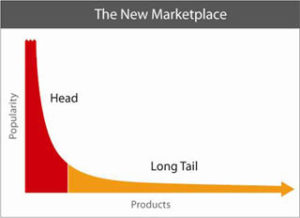Note: I originally wrote this entry in … 2008? 2009? Some era in which Blockbuster still existed. Not as a metaphor, but as a brick and mortar chain. (Imagine!)
Since then, I migrated my blog. In so doing, I lost a lot of content. Including the scanned copy of my college thesis, A History of the Free School Movement. But the long tail of the internet wouldn’t let it go. A few days ago — Nov 17, 2022 — I received ANOTHER email looking for my thesis. In part because it was being discussed on another blog (see comment #151). An enterprising reader who goes by the handle Darkest Yorkshire offered the following: “Tate Hausman wrote what I remember being a very interesting history of free schools in America, but it’s not online.”
Well, Darkest Yorkshire, it’s back online again. Viola — Tate Hausman Free School Thesis. Thank you for making me aware that still, 24 years after penning it, my thesis continues to have some relevance. Granted, to a veeeeeeery thin part of the Internet’s long tail. Still, I’m proud! Especially after finding out that it was cited on Wikipedia in 2017, in a 2015 dissertation by Dani Biancolli, and even more recently, in a 2020 dissertation by Camille Scott Tolliver. Maybe reposting it will help someone else again soon.
Yesterday, one of my favorite Web 2.0 jargon-concepts – the long tail – caught up with me, personally.
It started with an email from Mark Little, someone I’ve never met in my life. It said:
From: “Mark Little”
Subject: A History of the Free School Movement?I’m looking for this reference:
Hausman, Tate. (1998) “A History of the Free School Movement”, Brown University.
Are you that Tate Hausman? If so, could you please give me a pointer to how I can get a copy?
I am, in fact, that Tate Hausman. “A History of the Free School Movement” was my senior honors thesis at Brown. As far as I know, its still the definitive history of an educational movement that flourished in the late 60’s, peaked in 1974, and then precipitously dropped out sight.
Free Schooling wasn’t a widely-known movement. At its peak, it might have encompassed 100,000 students. It certainly didn’t attract much academic or journalistic attention, then or now. In my nine years since graduating college, I’ve only had one other inquiry about the paper, and that was from one of the sources I interviewed, wondering whether the paper had ever gotten published.
Before the internet, my paper’s lifespan would have been less than a year old. It would have been written, presented, proudly filed alongside the 30 other Education Department theses of 1998, and promptly forgotten. Maybe, years later, some enterprising student would have stumbled upon it in the stacks. Probably not.
But thanks to the Web, not only did Mark Little find a reference to my paper, he was also able to find me, the original author, and request a copy. The ONLY copy, I should note. Et voila — the long tail in action.
The phrase long tail comes from a description of a typical sales graph:

The X axis represents products. The Y axis represents popularity, or more traditionally, sales. In most markets, a very few products account for a large number of sales (that’s the red part, the “head”). The vast majority of products sell very infrequently (that’s the yellow part, the “long tail,” which snakes off to the right).
In the brick and mortar world, where physical space limits your inventory, this means that the vast majority of items don’t make it to market. So Blockbuster stocks 1,000 copies of Spiderman, but zero copies of Gang Girls 2000.
However, in a gargantuan marketplace with no shelf-space costs – ie, the internet – you can almost always find a buyer for even the most niche products or services. Amazon can “stock” 10 zillion titles, because even selling one copy of The Frog Whisperer a year is profitable, when it doesn’t have to compete for shelf space with The Da Vinci Code.
And thus, Mark Little, who turns out to have attend a Free School from 1968-1970, was able to use the Internet to find the one and only copy of an obscure, 10-year-old research paper that only he and a handful of other Americans would understand, much less seek out and enjoy.
Long live the long tail!
